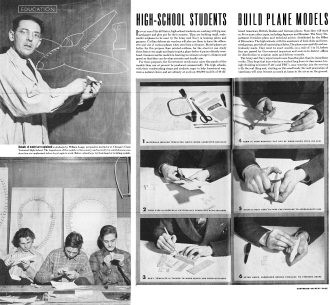 Table of Contents
Table of Contents
Wax nostalgic about and learn from the history of early technology. See
articles from Life, published 1883-1972 . All copyrights hereby acknowledged. |
When this issue of Life magazine came out in March of 1942, America was
only a couple months past when the Imperial Japanese Navy Air Service executed
the surprise attack on Pearl Harbor shortly before Christmas on a quiet Sunday
morning. As with when a group of Muslim extremists attacked America on September
11, 2001, the vast majority of the country pulled together and delivered a
significant response to the perpetrators. During Word War II, in order to help train our troops
recognize and differentiate between Allied aircraft and Axis aircraft, models
were built at a scale which would fairly represent what the real thing would
look like in the sky at a distance that placed it within range of anti-aircraft
munitions. The Boy Scouts and other community organizations joined in on the
effort, as well as commercial companies that manufactured identification models
(see Uncle Sam's Plastic
Air Force, September 1973 American Aircraft Modeler). Occasionally,
a group of the production models appear on eBay. High-School Students Build Plane Models

Details of model are explained to students by William Lange,
aeronautics instructor at Chicago's Crane Technical High School. The importance
of the models to the country and necessity for carefulness in construction are emphasized
before boys begin to work.
Schoolboys try their hand at building models.
1) Materials include templates, knife, wood, sandpaper and glue.
2) First step is carefully cutting out templates with scissors.
3) Next, template is tacked to wood block and form outlined.
4) Form is then roughly cut out of wood block with jig saw.
5) Knife is next used to pare the fuselage to approximate size.
6) After knife, sandpaper brings fuselage to finished shape.
Life's Cover
Melvin Melichar, the 15-yearold Chicago schoolboy on this week's cover, is carefully
sandpapering and putting the finishing touches on a model of a P-39 pursuit plane
which he is making for the Government. Thousands of other boys all over the country
are also making models, which will be used by the Army, Navy and Office of Civilian
Defense. Melvin's work is important, for the civilian and armed forces need models
of Axis and United Nations planes to instruct gunners and air-raid wardens in identification.
For more about model plane construction, see pages 118-121.
***
In every one of the 48 States, high-school students are working with jig saw,
sandpaper and glue pot for their country. They are building small, scale-model airplanes
to be used by the Army and Navy in training pilots and gunners. Civilian defense
air wardens will also use them to learn the silhouette and size of various planes
when seen from a distance. Model planes are better for this purpose than printed
outlines, for the observer can study them from every angle and learn to spot a plane
before it passes directly overhead. Gunners use the models in learning to estimate
a target's distance and speed so that they can develop accurate and deadly aim.
For these purposes, the Government needs many more thousands of the models than
can at present be produced commercially. The high schools, with their woodworking
shops and students eager to help America at war, were a natural choice and are already
at work on 200,000 models of 20 different American, British, Italian and German
planes. Soon they will start on 30 or more other types, including Japanese and Russian.
The Navy Department furnishes plans and technical advice, distributed by the Office
of Education. The high schools, with the assistance of local clubs and interested
groups, provide all material and labor. The planes are carefully and meticulously
made. They must be exact models, on a scale of 1 to 72, before they are passed by
Government inspectors and sent on to district offices for distribution to aviation
units and defense councils.
The Army and Navy expect much more from this plan than its immediate results.
They hope that boys who have worked long hours in class rooms, lovingly finishing
miniature P-40's and PBY's, may someday join the services to fly the real thing
and, starting on this small scale, the next generation of Americans will soon become
as much at home in the air as on the ground.
Posted April 22, 2023
|